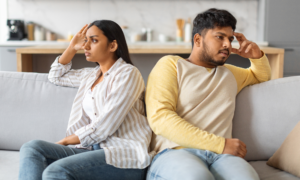In Indian culture, marriage is seen not only as a relationship between two individuals, but also as a sacred connection between families and community. However, in the changing landscape of relationships in modern India, this connection and bond is often put to test.
In the midst of relationship challenges, the concept of marriage advice appears as a flicker of hope. But let’s be honest, in India, counseling is still not considered as a go-to option for many. Most couples feel that marriage counseling is the last resort to save their marriage or is something that is court mandated in times of legal separation. It is not so, relationship counseling can help couples understand each other better, as well as can heal and empower relationships.
So, let’s tell you all about marriage counseling, signs that you should see a counselor, and debunk some common misconceptions as well.
What is Marriage Counseling?
Marriage counseling, also known as couples therapy, is a type of psychotherapy that aims to help couples identify and resolve conflicts, improve their relationship, and make thoughtful decisions about their future together.
The couples are guided by approved therapists, known as marriage and family therapists (MFT), who provide the couples a safe space to explore their feelings, behaviors and thoughts.
The main objective of marriage counseling is to increase satisfaction with regard to marriage, promote communication and restore the basis of trust and understanding, which has been dis-balanced.
12 Signs that it’s time to see a Marriage Counselor
So, when should a couple seek a marriage counselor? Here are some tell signs:
- Constant Arguments or Grudges: If every little thing turns into a fight, it’s probably time to get some outside perspective. Or if you’re starting to resent your partner or feel constantly irritated.
- Lack of communication: When you both just stop talking, like the silence is louder than anything else.
- Trust Issues/ Infidelity: If there’s been a betrayal and you’re stuck on it, trust is super hard to rebuild on your own.
- Financial conflicts: You have disagreements over finances, caused by different values, spending habits, or the financial pressures of large family responsibilities, can cause significant stress.
- Cultural Conflicts: When family traditions, cultural expectations or religious differences clash and cause tension.
- Family Dynamics: When parents or in-laws start meddling in your relationship and dictating what you should do .For example, telling you when to go out, how to talk to one another.
- Pressure to Have Kids: When one person feels ready and the other doesn’t, but there’s pressure from everyone around.
- Gender Roles: Struggles over who is “supposed” to do what, especially with more traditional expectations.
- Intimacy Issues: If the physical side of things has changed or just doesn’t feel the same.
- Repeated Fights over Same Topic: Arguing about the same stuff over and over, with zero progress. For example, finances or parenting, etc.
- Feeling of Disconnection: When you’re together but still feel like you’re on different planets and sharing parallel lives.
- Thinking about Ending It: You have reached a point when breaking up or taking a break is crossing your mind a lot.

How can marriage counseling help you and your relationship?
For many couples, counseling can be a pivotal step towards rekindling love and ensuring the longevity of their union. And, here’s how it helps:
- Better Communication: You learn how to talk things out without yelling or shutting down. Addressing stuff early can stop it from turning into a bigger deal later.
- Stop the Cycle of Fights: Get help figuring out how to actually resolve issues instead of just arguing about them.
- Bring Back the Spark: Work on getting closer and feeling connected again.
- Outside Perspective: Sometimes you just need someone who’s not in the middle of it all to give you some clarity.
- Personal Growth: You learn a lot about yourself and how your actions affect the relationship.

Common misconceptions about counseling
Let’s debunk some common misconceptions that many people have around Couples or Relationship counseling:
- “Counseling Means We’re Failing”: It actually means you care enough to make things work.
- “It’s Only for Couples who are about to Break Up”: Nah, it’s for any couple who wants to improve things, whether it’s small issues or bigger ones.
- “The Counsellor Will Pick Sides”: A good counselor won’t take sides – they’re there to help both of you.
- “It’s a Weak Move”: Honestly, it takes strength to admit you need help and do something about it.
How to pick the right marriage counsellor?
- Check Their Background: Make sure they’re legit and know what they’re doing.
- Comfort Level: You should feel comfortable talking to them—trust your gut on this.
- Look for a Match: If you have specific issues (like cultural stuff), find someone who gets that.
- Their Approach: Some are more about problem-solving, others more about listening—figure out what you need.
- Ask Around: Recommendations from friends or family can be really helpful.
- Schedule Compatibility: Make sure their availability fits with yours so you can actually attend sessions regularly.
In India, there is still a certain reluctance in accepting counseling. Culturally in a society where not just two individuals, even families make a part of a relationship, the concept of seeking external help and support is still alien.
However, a significant shift is occurring due to increased awareness, education, and media influence portraying the benefits of therapy. So, it’s time to shed the negative image or apprehensions around the idea of approaching a marriage counselor to address the issues in your relationship.
Also Read: Experts tell us how to support your partner when they are struggling
Also Read: 7 Vastu Shastra Tips you should not ignore before buying a new home
Meet our Expert Guest Author: Dr Rachna Khanna Singh is a Mental Wellness, Relationship, Lifestyle & Stress Management Expert. She is the HoD of Holistic Medicine & Mental Wellness at Artemis Hospital, Gurgaon; and, founder and director of The Mind and Wellness Studio.


